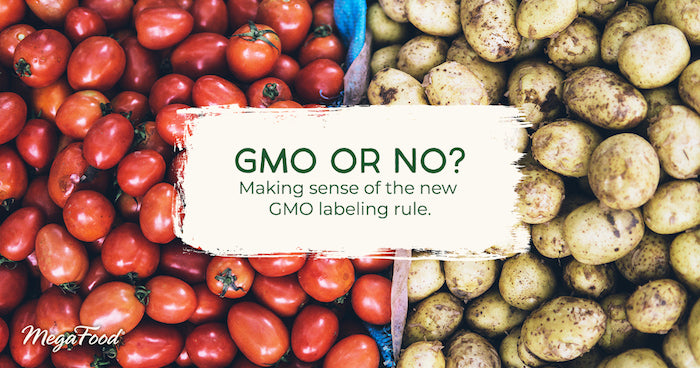A digestive health dictionary: key terms for understanding your gut

Erin Stokes, Naturopathic Doctor, MegaFood Medical Director | January 2019
There is no question that the health of our gut plays a large role in our overall health and well-being.* It is important to be proactive with our digestive health, though when it comes to understanding it, there’s a lot to unpack. It doesn’t make it any easier that many of the terms are often used interchangeably: bacteria and microbe, for example.
Let’s untangle the terms that relate to our digestive system, starting with:
Digestive System
To understand digestive health, it is important to understand the parts of the body that we are referencing. The digestive system is a complex network of organs responsible for breaking down the food we eat so that we can absorb the nutrients and fuel it contains. This process encompasses the mouth, salivary glands, esophagus, stomach, small Intestine, large intestine, and rectum, with additional support by the liver, gallbladder, and pancreas.
Gut
When people refer to their “gut,” they are often referring to a specific portion of their digestive system - their stomach and intestines. The gut is also where we most often experience digestive distress.
Microbiome
The microbiome refers to the complex community of trillions of microorganisms that inhabit your skin, nose, mouth, gut, and more, and play a vital role in maintaining your health.* These little microbes extract and synthesize vitamins and other nutrients from your food. They regulate digestion, metabolism, and elimination, and fine-tune your immune system.
Bacteria
Bacteria, in the context of digestive health, is used to refer to the individual microbes found in our gut. It is often used interchangeably with “microbes,” though the latter is more inclusive of beneficial yeasts as well.
Probiotics
We’re going straight to the expert for this one: “Probiotics are live bacteria and yeast, or ‘friendly’ microbes, that are found in certain foods or in supplements, which are particularly beneficial for our digestive tract. (Tieraona Low Dog, MD Fortify Your Life)” As Doctor Low Dog indicates, these individual microbes - a combination of live bacteria and yeasts - are referred to as probiotics. All of the probiotics found in our body, collectively, create our microbiome.
Strain
When we discuss probiotics, or beneficial gut bacteria, we often refer to specific strains. There are thousands of different types (or strains) of probiotics that are beneficial to our health.* Science continues to uncover the various benefits of individual strains, and many options are now available, whether you’re looking for a wide range of strains to support broad-spectrum digestive health, or a specific strain for more targeted support.*
CFU
This acronym refers to “colony-forming units,” and is a fancy way of telling you how many live bacteria are present. Each bacteria present in a product would represent one colony-forming unit. Because not all bacteria survive the perilous journey to the gut, and our beneficial bacteria are dying off on a regular basis, it is standard to see CFU counts in the billions. More isn’t always better when it comes to CFUs, either. Many of us do well on a daily maintenance dose between 5-20 billion CFUs. Higher potencies can be appropriate when addressing specific concerns or compromised gut health.
Prebiotics
Prebiotics are the foods that nourish our probiotic colonies. Probiotics thrive on a diet of indigestible sugars and fibers, which can be found in foods such as whole grains, legumes, and root vegetables. Prebiotics, therefore, are essential to ensuring our probiotics aren’t merely driving through our digestive system, but actually parking there.
Just as gut health is foundational to optimal health,* knowledge is foundational to understanding. Bookmark this blog as a reference for the next time you’re pondering the difference between a probiotic and a prebiotic, or the role of a colony forming unit.
Need more foundational info on your digestive health? Continue your journey towards a happy gut.


Leave a comment
This site is protected by hCaptcha and the hCaptcha Privacy Policy and Terms of Service apply.